模块5 Unit 3 Science versus nature Grammar and usage(2) 课件(20张PPT)
文档属性
| 名称 | 模块5 Unit 3 Science versus nature Grammar and usage(2) 课件(20张PPT) |
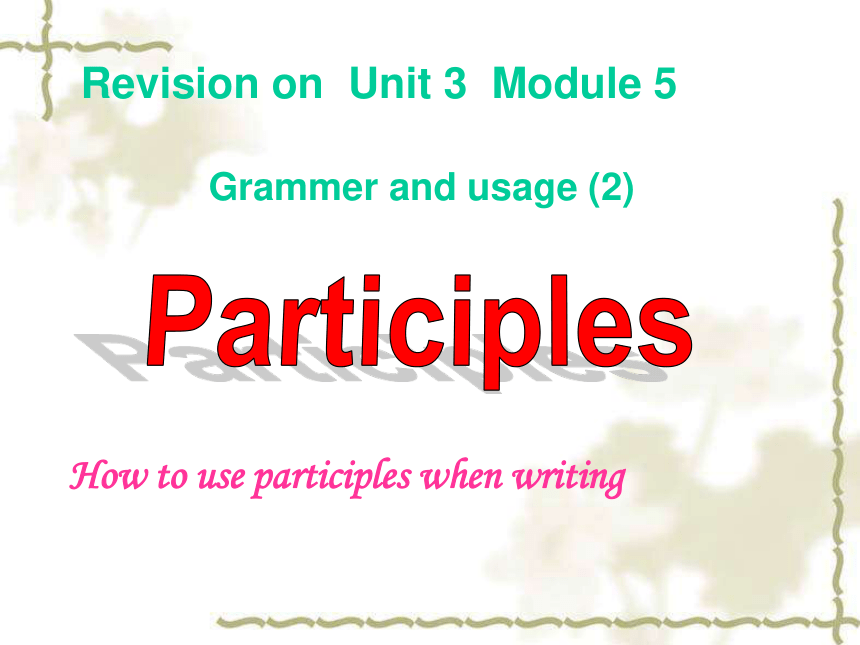
|
|
| 格式 | zip | ||
| 文件大小 | 2.3MB | ||
| 资源类型 | 教案 | ||
| 版本资源 | 牛津译林版 | ||
| 科目 | 英语 | ||
| 更新时间 | 2020-02-26 00:00:00 | ||
图片预览

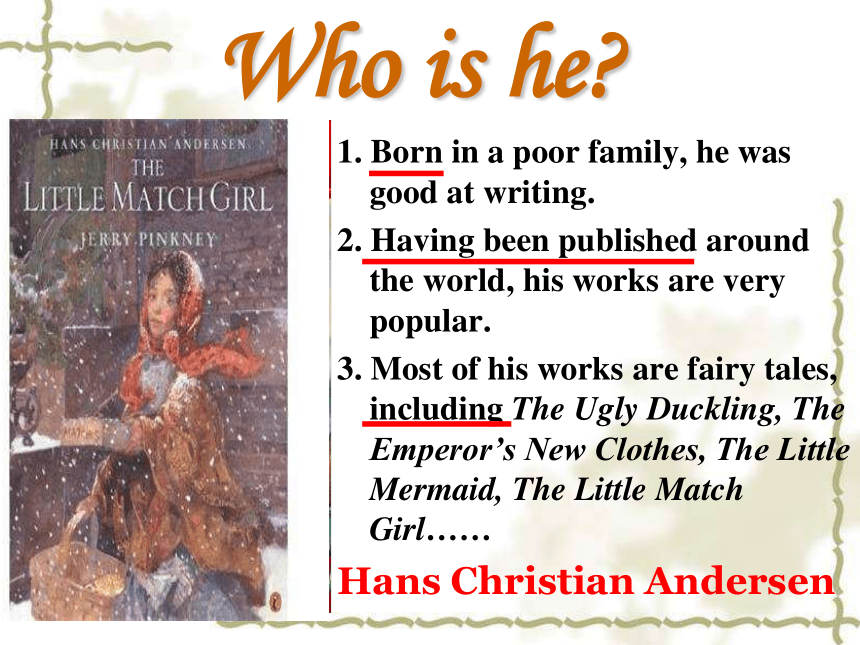
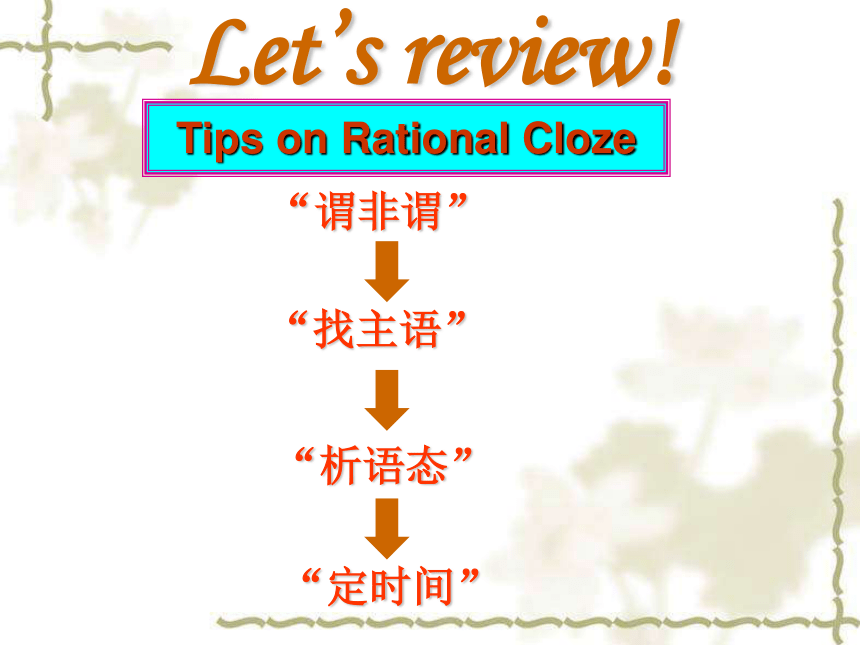
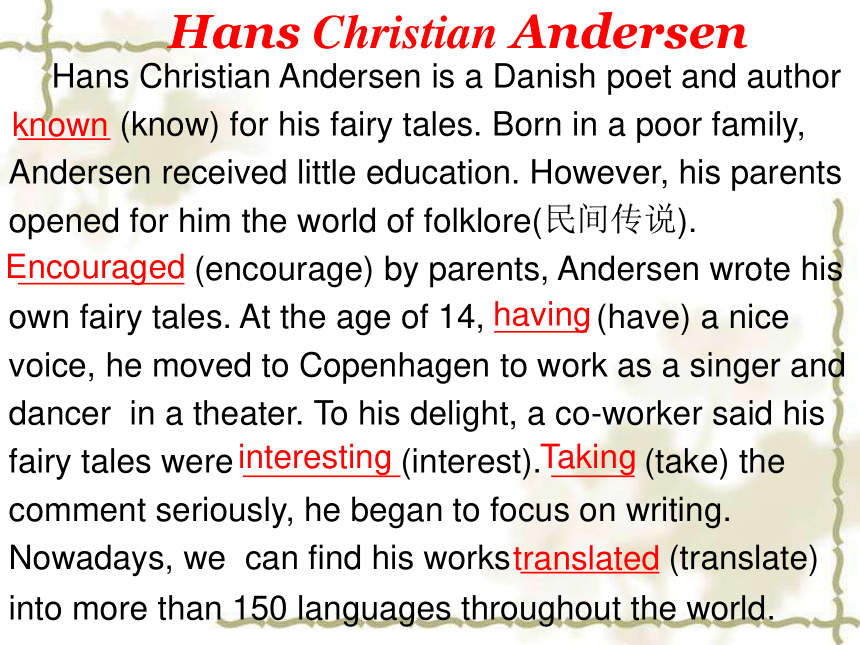
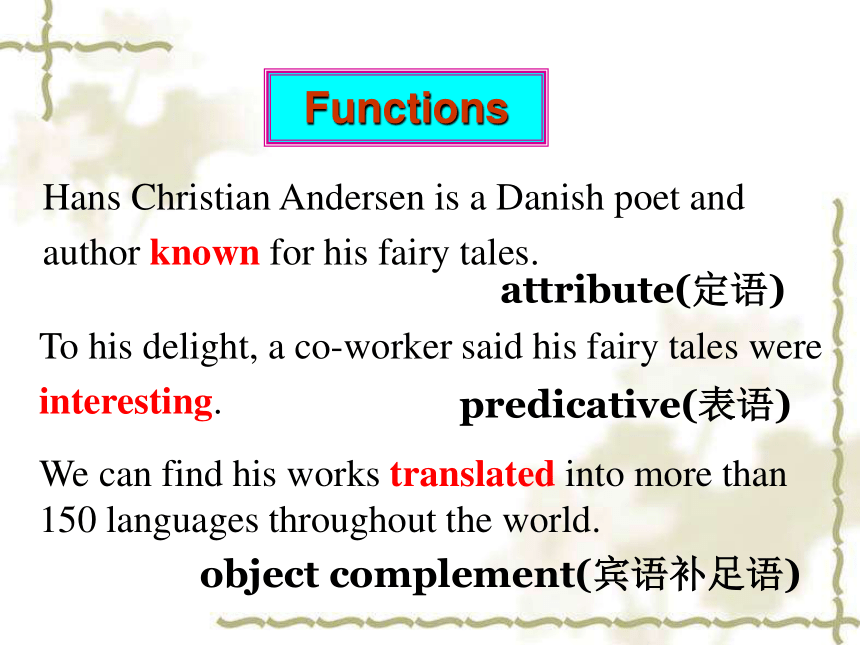
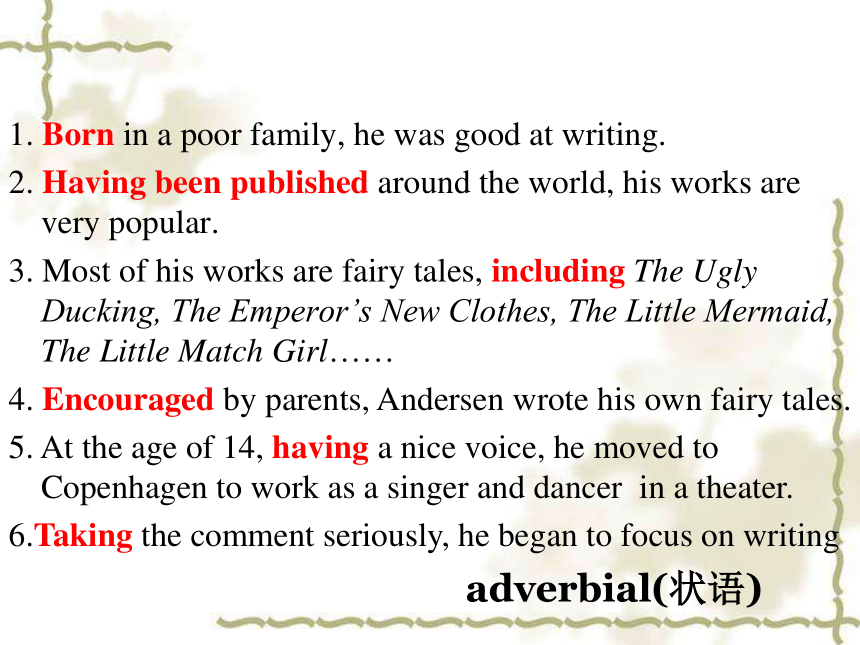
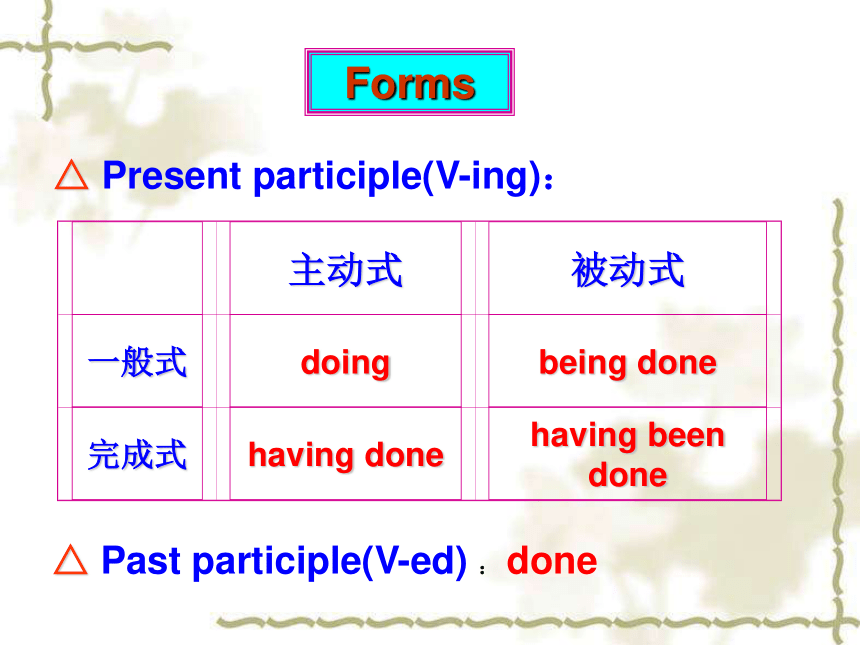
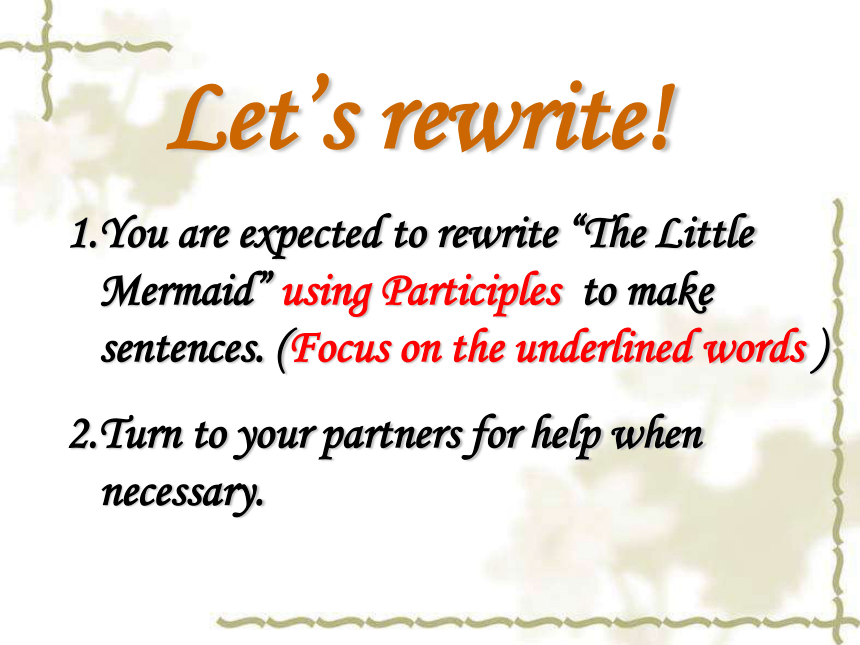
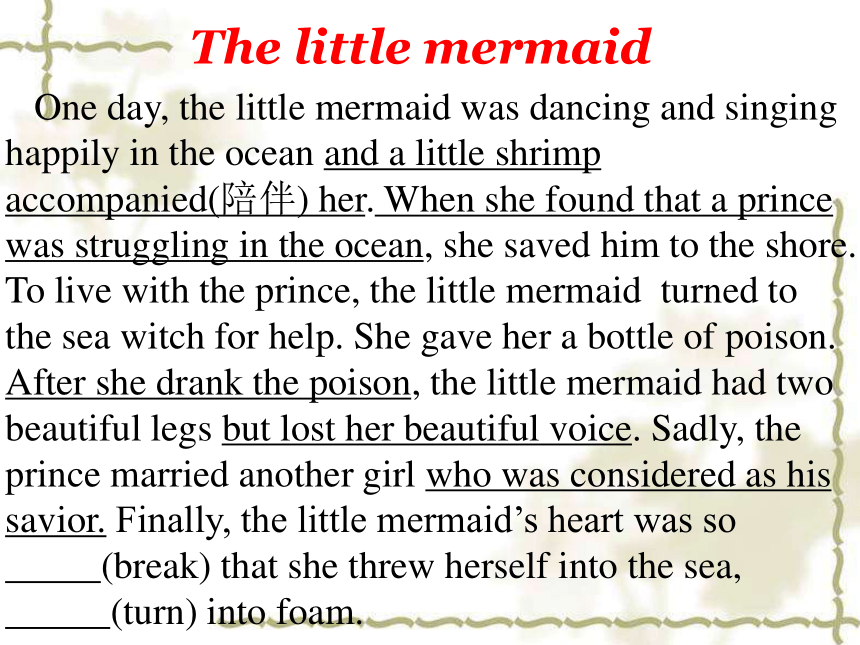
文档简介
(共20张PPT)
Participles
How to use participles when writing
Revision on Unit 3 Module 5
Grammer and usage (2)
Who is he?
1. Born in a poor family, he was good at writing.
2. Having been published around the world, his works are very popular.
3. Most of his works are fairy tales, including The Ugly Duckling, The Emperor’s New Clothes, The Little Mermaid, The Little Match Girl……
Hans Christian Andersen
“谓非谓”
“找主语”
“析语态”
“定时间”
Tips on Rational Cloze
Let’s review!
Hans Christian Andersen
Hans Christian Andersen is a Danish poet and author
(know) for his fairy tales. Born in a poor family, Andersen received little education. However, his parents opened for him the world of folklore(民间传说).
(encourage) by parents, Andersen wrote his own fairy tales. At the age of 14, (have) a nice voice, he moved to Copenhagen to work as a singer and dancer in a theater. To his delight, a co-worker said his fairy tales were (interest). (take) the comment seriously, he began to focus on writing. Nowadays, we can find his works (translate) into more than 150 languages throughout the world.
known
Encouraged
having
interesting
Taking
translated
attribute(定语)
Hans Christian Andersen is a Danish poet and author known for his fairy tales.
To his delight, a co-worker said his fairy tales were interesting.
predicative(表语)
We can find his works translated into more than
150 languages throughout the world.
object complement(宾语补足语)
Functions
adverbial(状语)
1. Born in a poor family, he was good at writing.
2. Having been published around the world, his works are very popular.
3. Most of his works are fairy tales, including The Ugly Ducking, The Emperor’s New Clothes, The Little Mermaid, The Little Match Girl……
4. Encouraged by parents, Andersen wrote his own fairy tales.
5. At the age of 14, having a nice voice, he moved to Copenhagen to work as a singer and dancer in a theater.
6.Taking the comment seriously, he began to focus on writing
Forms
?
主动式
被动式
一般式
doing
being done
完成式
having done
having been done
△?Past participle(V-ed) :
△ Present participle(V-ing):
done
Let’s rewrite!
1.You are expected to rewrite “The Little Mermaid” using Participles to make sentences. (Focus on the underlined words )
2.Turn to your partners for help when necessary.
One day, the little mermaid was dancing and singing happily in the ocean and a little shrimp accompanied(陪伴) her. When she found that a prince was struggling in the ocean, she saved him to the shore. To live with the prince, the little mermaid turned to the sea witch for help. She gave her a bottle of poison. After she drank the poison, the little mermaid had two beautiful legs but lost her beautiful voice. Sadly, the prince married another girl who was considered as his savior. Finally, the little mermaid’s heart was so
(break) that she threw herself into the sea,
(turn) into foam.
The little mermaid
One day, the little mermaid was dancing and singing happily in the ocean and a little shrimp accompanied(陪伴) her.
One day, the little mermaid was dancing and singing happily in the ocean,
.
accompanied by a little shrimp
with a little shrimp accompanying her.
When she found that a prince was struggling
in the ocean, she saved him to the shore.
_________ the prince
in the ocean,
she saved him to the shore.
Finding
struggling
After she had drunk the poison, the little mermaid
had two beautiful legs but lost her beautiful voice.
___________ the poison, the little mermaid
had two beautiful legs, .
Having drunk
poison
losing her beautiful voice
Sadly, the prince married
another girl who was
considered as his savior.
Sadly, the prince married
another girl
.
considered
as his savior
Finally, the little mermaid’s
heart was so (break)
that she threw herself into
the sea, (turn) into
foam.
broken
turning
One day, the little mermaid was dancing and singing happily in the ocean accompanied by a little shrimp. Finding a prince struggling in the ocean, she saved him to the shore. To live with the prince, the little mermaid turned to the sea witch for help. She gave her a bottle of poison. Having drunk the poison, the little mermaid had two beautiful legs, losing her beautiful voice. Sadly, the prince married another girl considered as his savior. Finally, the little mermaid’s heart was so broken that she threw herself into the sea, turning into foam.
The little mermaid
1.You are expected to translate “The Little Match Girl” using as many Participles as possible. (Hint has been clearly given.)
2. You can complete the task in groups. Each
group member tries best to do it individually .
And then discuss it together.
3. Present your translation in the form of telling
the story by representative of each group.
Let’s translate!
这是一个下雪的夜晚(participle as attribute)。一个小女孩走在大街上卖着火柴(participle as adverbial)。因为火柴还没有卖完(participle as adverbial),她看起来很担心(participle as predicative)。她实在太冷了只好点燃火柴取暖。透过明亮而温暖的火光,她看见炉火在熊熊燃烧,看见餐桌上摆满了美味佳肴(participle as object complement)。她还看见一棵装饰精美的圣诞树和一颗滑落天际的流星(participle as attribute)。最后,她看见自己被奶奶带到了幸福的天国(participle as object complement)。第二天清晨,人们发现可怜的小女孩躺在地上冻死了(participle as object complement and adverbial)。
卖火柴的小女孩
Telling the story
Let’s show!
The Little Match Girl
It was a snowing night. A little girl went along the street, selling matches. Not having sold out all the matches, she looked very worried. She was so cold that she lit the matches to warm herself. Through the bright and warm flame, she saw a stove fire burning and a table covered with all kinds of delicious foods. Also she spotted a beautifully decorated Christmas tree and a falling star in the sky. At last, she saw herself taken away by her grandmother to the happy heaven. At the dawn of the next day, people found the little poor girl lying on the ground, frozen to death.
1. Polish your translation using as many participles as possible.
2. Review the participles further by viewing the micro-course vedio
3. Read more English original works and try to rewrite using participles.
?
?
Assignment
Participles
How to use participles when writing
Revision on Unit 3 Module 5
Grammer and usage (2)
Who is he?
1. Born in a poor family, he was good at writing.
2. Having been published around the world, his works are very popular.
3. Most of his works are fairy tales, including The Ugly Duckling, The Emperor’s New Clothes, The Little Mermaid, The Little Match Girl……
Hans Christian Andersen
“谓非谓”
“找主语”
“析语态”
“定时间”
Tips on Rational Cloze
Let’s review!
Hans Christian Andersen
Hans Christian Andersen is a Danish poet and author
(know) for his fairy tales. Born in a poor family, Andersen received little education. However, his parents opened for him the world of folklore(民间传说).
(encourage) by parents, Andersen wrote his own fairy tales. At the age of 14, (have) a nice voice, he moved to Copenhagen to work as a singer and dancer in a theater. To his delight, a co-worker said his fairy tales were (interest). (take) the comment seriously, he began to focus on writing. Nowadays, we can find his works (translate) into more than 150 languages throughout the world.
known
Encouraged
having
interesting
Taking
translated
attribute(定语)
Hans Christian Andersen is a Danish poet and author known for his fairy tales.
To his delight, a co-worker said his fairy tales were interesting.
predicative(表语)
We can find his works translated into more than
150 languages throughout the world.
object complement(宾语补足语)
Functions
adverbial(状语)
1. Born in a poor family, he was good at writing.
2. Having been published around the world, his works are very popular.
3. Most of his works are fairy tales, including The Ugly Ducking, The Emperor’s New Clothes, The Little Mermaid, The Little Match Girl……
4. Encouraged by parents, Andersen wrote his own fairy tales.
5. At the age of 14, having a nice voice, he moved to Copenhagen to work as a singer and dancer in a theater.
6.Taking the comment seriously, he began to focus on writing
Forms
?
主动式
被动式
一般式
doing
being done
完成式
having done
having been done
△?Past participle(V-ed) :
△ Present participle(V-ing):
done
Let’s rewrite!
1.You are expected to rewrite “The Little Mermaid” using Participles to make sentences. (Focus on the underlined words )
2.Turn to your partners for help when necessary.
One day, the little mermaid was dancing and singing happily in the ocean and a little shrimp accompanied(陪伴) her. When she found that a prince was struggling in the ocean, she saved him to the shore. To live with the prince, the little mermaid turned to the sea witch for help. She gave her a bottle of poison. After she drank the poison, the little mermaid had two beautiful legs but lost her beautiful voice. Sadly, the prince married another girl who was considered as his savior. Finally, the little mermaid’s heart was so
(break) that she threw herself into the sea,
(turn) into foam.
The little mermaid
One day, the little mermaid was dancing and singing happily in the ocean and a little shrimp accompanied(陪伴) her.
One day, the little mermaid was dancing and singing happily in the ocean,
.
accompanied by a little shrimp
with a little shrimp accompanying her.
When she found that a prince was struggling
in the ocean, she saved him to the shore.
_________ the prince
in the ocean,
she saved him to the shore.
Finding
struggling
After she had drunk the poison, the little mermaid
had two beautiful legs but lost her beautiful voice.
___________ the poison, the little mermaid
had two beautiful legs, .
Having drunk
poison
losing her beautiful voice
Sadly, the prince married
another girl who was
considered as his savior.
Sadly, the prince married
another girl
.
considered
as his savior
Finally, the little mermaid’s
heart was so (break)
that she threw herself into
the sea, (turn) into
foam.
broken
turning
One day, the little mermaid was dancing and singing happily in the ocean accompanied by a little shrimp. Finding a prince struggling in the ocean, she saved him to the shore. To live with the prince, the little mermaid turned to the sea witch for help. She gave her a bottle of poison. Having drunk the poison, the little mermaid had two beautiful legs, losing her beautiful voice. Sadly, the prince married another girl considered as his savior. Finally, the little mermaid’s heart was so broken that she threw herself into the sea, turning into foam.
The little mermaid
1.You are expected to translate “The Little Match Girl” using as many Participles as possible. (Hint has been clearly given.)
2. You can complete the task in groups. Each
group member tries best to do it individually .
And then discuss it together.
3. Present your translation in the form of telling
the story by representative of each group.
Let’s translate!
这是一个下雪的夜晚(participle as attribute)。一个小女孩走在大街上卖着火柴(participle as adverbial)。因为火柴还没有卖完(participle as adverbial),她看起来很担心(participle as predicative)。她实在太冷了只好点燃火柴取暖。透过明亮而温暖的火光,她看见炉火在熊熊燃烧,看见餐桌上摆满了美味佳肴(participle as object complement)。她还看见一棵装饰精美的圣诞树和一颗滑落天际的流星(participle as attribute)。最后,她看见自己被奶奶带到了幸福的天国(participle as object complement)。第二天清晨,人们发现可怜的小女孩躺在地上冻死了(participle as object complement and adverbial)。
卖火柴的小女孩
Telling the story
Let’s show!
The Little Match Girl
It was a snowing night. A little girl went along the street, selling matches. Not having sold out all the matches, she looked very worried. She was so cold that she lit the matches to warm herself. Through the bright and warm flame, she saw a stove fire burning and a table covered with all kinds of delicious foods. Also she spotted a beautifully decorated Christmas tree and a falling star in the sky. At last, she saw herself taken away by her grandmother to the happy heaven. At the dawn of the next day, people found the little poor girl lying on the ground, frozen to death.
1. Polish your translation using as many participles as possible.
2. Review the participles further by viewing the micro-course vedio
3. Read more English original works and try to rewrite using participles.
?
?
Assignment
